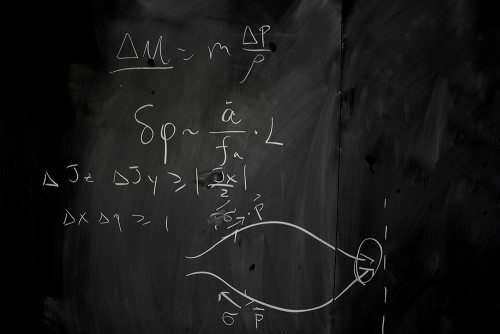Tag archives: general relativity
Test your brains with the Physics World blackboard quiz
By Matin Durrani
Can you tell what branch of physics is being described on the blackboard above? It’s one of six photographs taken by the communications folks at the Perimeter Institute for Theoretical Physics in Waterloo, Canada, where blackboards are an integral feature of the building’s design, appearing everywhere from the lifts to coffee areas.
In this quiz, your task is to study six blackboards and match them up with the physics topics they represent. There’s no prize, other than the satisfaction of having at least some inkling of what those clever theorists at the Perimeter are up to.
So here are the six topics:
• Accretion physics and general relativity
• Cosmology
• Neural networks and condensed matter
• Particle physics 1
• Particle physics 2
• Strings
And here are the six blackboards (you can click on each to see it in more detail).
Cats and causality: is your moggy an Isaac Mewton?

Causal connection: are cats feline physicists? (CC BY David Corby)
By Hamish Johnston
It’s been a very difficult week for some UK-based physicists for reasons that you can read about here. Therefore I thought this week’s Red Folder should be a bit of a tonic, so here’s a combination that’s guaranteed to put smile on even the glummest face: cats, physics and the Internet.
“Cats seem to grasp the laws of physics,” at least according to Saho Takagi and colleagues at Kyoto University in Japan. It seems that our feline friends have a firm understanding of causality, as shown by their ability to recognize that an effect (an object falling out of an overturned container) is preceded by its cause (the noisy shaking of the object in the upright container). The cats quickly realized that a noisily shaken container would yield an object, but the silent shaking of an empty container would not.
Surfing the LIGO wave, sounding out black holes and more
By Matin Durrani and Tushna Commissariat
Unless you are completely disconnected from all electronic media, the Internet and don’t read a newspaper, by now you must have heard that the LIGO Virgo collaboration has made the first ever detection of gravitational waves, spewed out by two black holes merging into one. The story made waves across the world, if you will excuse the pun, and seemed to capture the interest of scientists and the public alike. Above you can listen to the chirp of the merger event, dubbed GW150914, that occurred 1.3 billion years ago, when multicellular life was just emerging on Earth. Indeed, these sounds are so intriguing that they are being turned into musical compositions.
Celebrating the centenary of Einstein’s general theory of relativity and asking what theorists have done lately
By Hamish Johnston
This week, people all over the world have been celebrating the 100th anniversary of Einstein’s general theory of relativity (GR). Einstein delivered his theory this week in November 1915. Not surprisingly, the Web has been buzzing with tributes to Einstein and explanations of his theory.
In the above video, the physicist Brian Greene and two young assistants demonstrate Einstein’s explanation of gravity using a huge piece of stretched Spandex. Why they have this Spandex ring in what appears to be their living room remains a mystery, but it and a large number of marbles do the trick when it comes to explaining GR.
Einstein’s legacy, 100 years on
By Tushna Commissariat
As readers of Physics World, you probably don’t need me to tell you that this year marks 100 years since legendary physicist Albert Einstein laid the foundations for his revolutionary general theory of relativity (GR). This month marks the exact time when he began giving a series of four weekly lectures – the first of which was on 4 November 1915 – to the Prussian Academy of Sciences in Berlin. Indeed, today is the centenary of the final lecture, when he presented his “Field equations of gravitation”. In the video above, philosopher and one-time physicist Jürgen Renn, from the Max Planck Institute for the History of Science in Berlin, gives a short and sweet explanation of GR and its impact on physics.
The ins and outs of black holes and a new way of thinking about general relativity
By Hamish Johnston
While at the Convergence conference at the Perimeter Institute (PI), Physics World’s Louise Mayor and I had dinner with Sean Gryb. He did his PhD at the PI and is now doing a postdoc at Radboud University Nijmegen in the Netherlands. In the above video he shares some of his highlights of the conference.
Gryb is working on “shape dynamics”, which is a new idea for re-evaluating Albert Einstein’s general theory of relativity (GR). The idea was initiated by Julian Barbour and Gryb became involved in the development of shape dynamics while he was at PI. He now belongs to a small international band of physicists who are developing the concept. While shape dynamics is an alternative treatment of GR, the ultimate goal of their work seems to be the creation of a new framework for a theory of quantum gravity – an important goal of theoretical physics.
